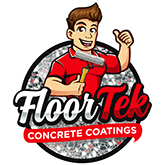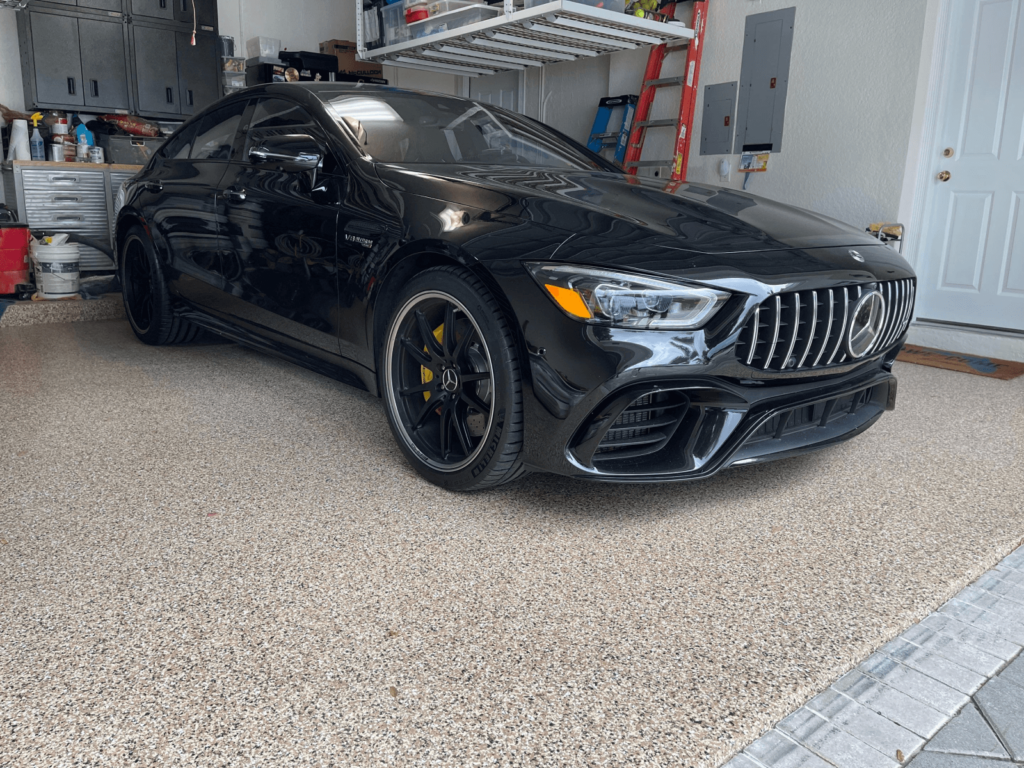The choice of coating is crucial when it comes to enhancing garage floors. Homeowners often weigh the unique benefits of two popular options: polyaspartic garage floor coatings, known for their rapid curing and high durability, and epoxy garage floor coatings, valued for their affordability and reliable protection. Let’s delve into the key differences between these coatings to help you determine your garage flooring needs.
What Is Polyaspartic Garage Floor Coating?
Polyaspartic is a type of floor coating that falls under the broader category of polyurea coatings. It’s a highly durable, flexible material for heavy-duty protection against abrasion, chemicals, and impact. Polyaspartic coatings cure very quickly, making them ideal for busy homeowners who need their garage floors ready for use quickly.
Polyaspartic garage floor coatings are perfect for areas with high foot traffic, heavy vehicles, and equipment. They form a seamless protective layer over the concrete, which increases the floor’s lifespan and maintains its appearance.
What Is Epoxy Garage Floor Coating?
Epoxy is a more traditional floor coating made by mixing resin and hardener. Applying it to concrete surfaces creates a tough, glossy finish resistant to stains, chemicals, and wear. Thanks to its affordability and reliable protection, epoxy has been a popular choice for garage floors for many years.
However, epoxy coatings require a longer curing time, typically several days, so you must plan accordingly for downtime. Additionally, epoxy can be less resistant to UV rays, causing it to yellow and fade over time, particularly in areas with significant sunlight exposure.
Key Differences Between Polyaspartic and Epoxy Garage Floor Coatings
Durability: Polyaspartic vs Epoxy
When it comes to durability, polyaspartic garage floor coatings are generally superior to epoxy. Polyaspartic coatings are resistant to impacts, abrasions, and chemical spills, making them ideal for high-traffic areas such as garages with a lot of vehicle movement and heavy equipment. Due to their greater flexibility, polyaspartic coatings also offer better long-term protection against cracking.
In comparison, while durable, epoxy is more prone to cracking under pressure or extreme conditions. It’s not as flexible as polyaspartic, so it may not perform well in areas with temperature fluctuations or heavy movement.
Curing Time: Polyaspartic Garage Floor Coating vs Epoxy
One significant difference between polyaspartic and epoxy coatings is curing time. Polyaspartic coatings cure much faster than epoxy, allowing for quick installation and a faster return to use. While an epoxy floor may take several days to heal, polyaspartic coatings can be ready for foot traffic within hours and vehicle traffic within a day. This makes polyaspartic coatings ideal for homeowners looking for minimal downtime during installation.
UV Stability: Polyaspartic vs Epoxy
Polyaspartic coatings have a significant advantage when it comes to UV stability. They do not yellow or fade when exposed to sunlight, making them perfect for garages that have natural light or outdoor spaces like patios or pool decks.
Conversely, epoxy is more prone to discoloration when exposed to UV light, which can be a significant drawback, especially in sunny areas. This is why polyaspartic coatings are often recommended for garages with windows or areas exposed to sunlight.
Aesthetic Appeal: Polyaspartic Garage Floor Coating vs Epoxy
Both polyaspartic and epoxy coatings come in various colors and finishes, allowing homeowners to choose the style that best matches their garage or home. However, polyaspartic coatings tend to maintain their vibrancy longer than epoxy.
Epoxy coatings tend to develop imperfections over time, especially in areas with high traffic or spills, while polyaspartic coatings are more resistant to fading and discoloration.
Flexibility: Polyaspartic vs Epoxy
When it comes to flexibility, polyaspartic coatings are far superior to epoxy. Due to their more elastic nature, polyaspartic coatings are less likely to crack under pressure. This added flexibility makes them the ideal choice for areas subject to thermal expansion or contraction, such as garages in regions with varying temperatures.
Epoxy coatings, on the other hand, are rigid and more likely to crack or chip if subjected to heavy impacts or movement.
With polyaspartic coatings, you can enjoy faster installation, UV resistance, enhanced durability, and chemical resistance. These practical benefits make polyaspartic coatings ideal for homeowners looking for a quick, durable, low-maintenance solution for their garage floors.
- Thanks to their rapid curing, polyaspartic coatings can have your garage floors ready for use within hours. This quick installation process is convenient and time-saving for busy homeowners.
- Unlike epoxy, polyaspartic coatings won’t turn yellow or fade when exposed to sunlight. This UV resistance feature reassures homeowners about the long-term aesthetics of their garage floors.
- Polyaspartic coatings are more rigid, flexible, and resistant to impact and abrasion than epoxy coatings. This enhanced durability feature ensures homeowners the long-lasting protection of their garage floors.
- Chemical Resistance: Polyaspartic coatings are highly resistant to oils, gasoline, and household cleaners, making them ideal for garages where spills are likely.
Benefits of Epoxy Garage Floor Coatings
- Cost-Effective: Epoxy is typically less expensive than polyaspartic coatings, making it a more budget-friendly option for homeowners.
- Trusted Technology: Epoxy has been a trusted solution for many years and offers reliable protection against wear and tear in lower-traffic areas.
- Variety of Styles: Epoxy coatings come in various colors and finishes, allowing homeowners to personalize their garage floor to match their style.
Which Is Better for Your Garage: Polyaspartic or Epoxy?
Choosing between polyaspartic garage floor coating and epoxy garage floor coating depends mainly on your specific needs and budget.
- If you’re looking for a coating that is quick to install, highly durable, and resistant to UV damage, polyaspartic is your best bet.
- Epoxy may be more affordable if you’re on a budget and can tolerate a longer curing time.
Why Choose Floortek Concrete Coatings for Your Polyaspartic Garage Floor Coating?
At Floortek Concrete Coatings, we specialize in polyaspartic floor coatings that are 10X better than epoxy. We offer lifetime warranties on all our coatings, ensuring that your investment in your garage floor is protected for years. Whether you want to upgrade your garage with a sleek, durable finish or enhance your driveway, our polyaspartic coatings provide the best durability, aesthetics, and quick installation.
Visit our Gallery for inspiration, or check out Our Services to learn how we can transform your garage. With our 1-day floor coatings service, your new floor will be ready for use before you know it!
Ready to enhance your garage floor? Contact us today for a free consultation, and you’ll receive 30% off your first installation!

